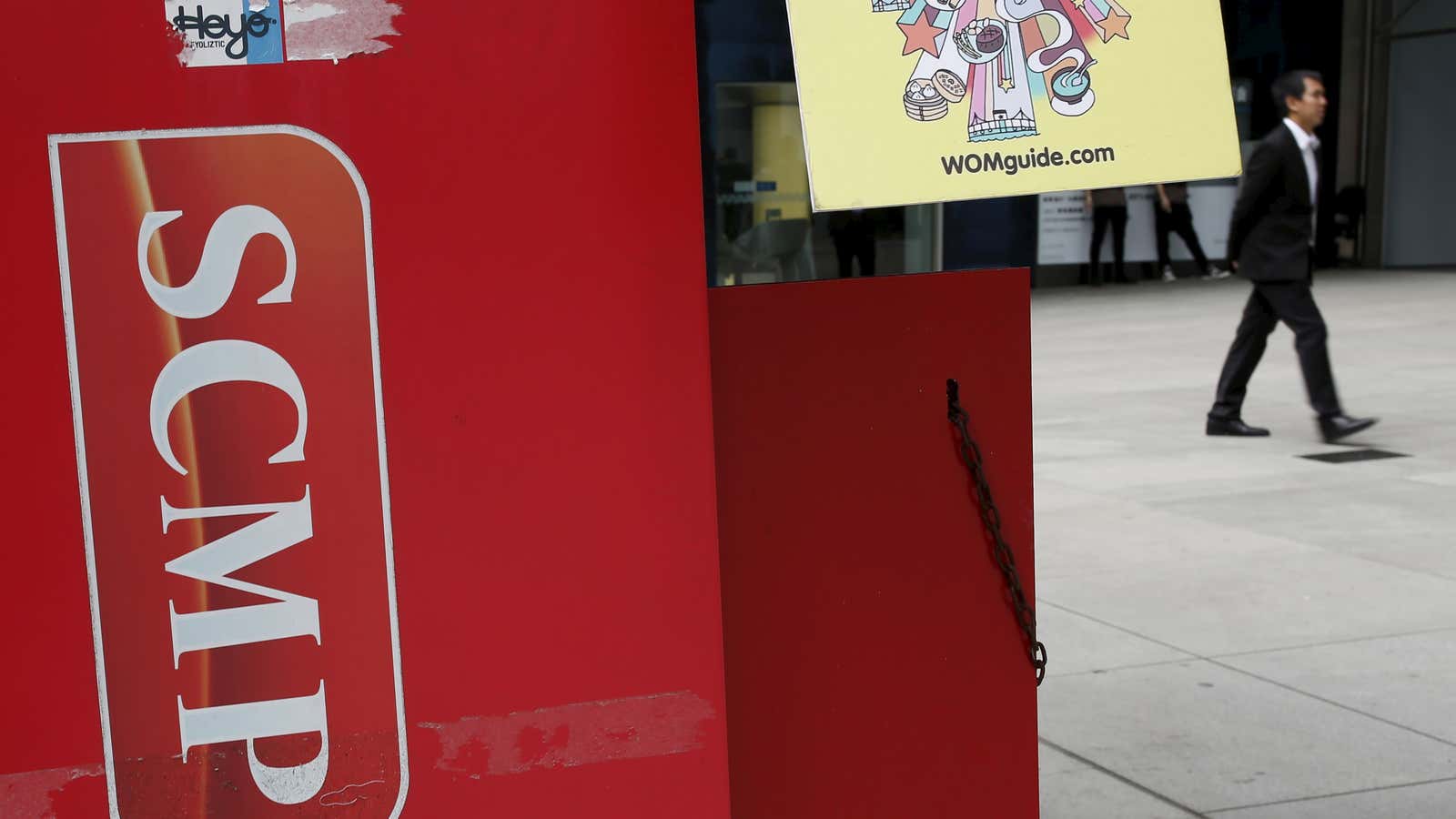This article has been updated and corrected with new information about bonus structures and staff departures.
Hong Kong’s historic South China Morning Post newspaper officially changed hands this week, and is now part of e-commerce giant Alibaba, whose executives have promised to use the paper to counteract what they call a negative portrayal of China in western media.
Mainland China’s media is heavily censored and mostly disseminates propaganda for the ruling Chinese Communist Party, so the SCMP’s employees and readers have worried that the century-old newspaper could become a mouthpiece for Beijing. This hasn’t been good for morale.
At least 17 editorial employees have left since the deal was first reported in early November, according to a list compiled by Quartz. There are currently about 30 positions open at the paper, former and current employees say.
In order to stem departures, Alibaba founder Jack Ma and former newspaper owner Robert Kuok are paying “cash gifts” to staff and full-time contractors, as well as more sizable bonuses to some senior staff, former and current employees tell Quartz.
A one time no-strings-attached “cash gift” was paid out on April 8 to all staff, which came from Ma’s and Kuok’s own pockets, not the newspaper or Alibaba’s finances, someone briefed on the payouts told Quartz.
A letter circulated to SCMP staff on April 5 and reviewed by Quartz lays out the general terms. “To show our appreciation, the SCMP will be distributing a one-off cash gift to all staff,” the letter says. It will vary depending on employees’ years of service, an accompanying e-mail from CEO Robin Hu said.
There were no more details in the letter, but people briefed on the payouts said individuals with less than two years at the SCMP were getting bonuses of over HK$5,000 ($644), while longer-term employees were offered more. There is a cap of HK$15,000 ($1,933). (While the amounts may seem paltry by banking standards, they’re sizable in journalism.)
Separately, several senior managers on the editorial and business side have been offered larger retention bonuses, which are based on their monthly salaries and years of service. An SCMP spokesman said he could not disclose the number of employees involved or the bonus structure, but said the purpose of them was “two-fold—to incentivize employees to do their best, and at the same time to retain” key members of staff.
While media takeovers in recent years have often been more about cost-cutting than trying to retain staff, paying to retain top talent is not unheard of. Ahead of being acquired by News Corp., Dow Jones set aside millions of dollars to cover top managers in case they were fired after the deal closed to “enhance the company’s ability to retain and attract management-level employees.”
A letter about the one-time “cash gift” was emailed to SCMP staff as Alibaba took down the paywall on its website. Profits at the SCMP have dwindled in recent years, as they have at many traditional news organizations:
One SCMP employee told Quartz many staffers didn’t get an annual bonus, which is normally distributed before Chinese New Year at the end of January or early February—and those who did got a smaller one than usual. “Many people are very angry,” he said.
An Alibaba spokesman declined to comment before this article was published. In a letter to Quartz after it was, the SCMP said that “editorial staff turnover has been minimal since last December and is in fact less than the same period in 2015.”
The number of open positions at the paper “include newly created positions as part of Alibaba Group’s commitment to invest in the newsroom,” the SCMP said. “Considering the slow state of employment among Hong Kong’s print media industry, which include the closure of several publications recently, the SCMP is in fact bucking the trend by increasing our rate of new hires.”
The letter distributed to staff on April 5 says the SCMP is entering a “new phase,” and that Alibaba will help SCMP with its “abundant resources” as the newspaper is “moving aggressively into new media.”
It also lays out the how the paper plans to cover China and Hong Kong:
Looking ahead, we believe that the SCMP’s unique position as a leading provider of information on China will become even more important. China’s economy may be entering into a new normal phase but its economic rise on the international stage is unstoppable. As its impact on the world stage gets even larger, demand for objective, in-depth and insightful information will become even greater.
In Hong Kong, “we will continue to sharpen our coverage of local issues,” the letter says, mentioning “one country, two systems” as “a development that is critical” to the city’s future.
Beijing has blocked the websites of most major Western media in China, including most recently the Economist’s, after publications wrote articles critical of top Communist Party members, their families, and the direction that the China’s economy is headed. It has become more difficult for foreign media to get visas to work in China, gain access to officials, or even speak to private business people and citizens, as president Xi Jinping cracks down on press freedom.
The SCMP had several departures this week, including a long-time culture writer. However, the SCMP said she will continue to contribute to the paper.
An earlier version of this story incorrectly said that “dozens” of staff had departed since the Alibaba deal was announced in December and mistakenly conflated the one-time “cash gifts” with the senior staff’s retention bonuses. The “gifts” were given freely, the bonuses are tied to remaining with the paper for a set time.
